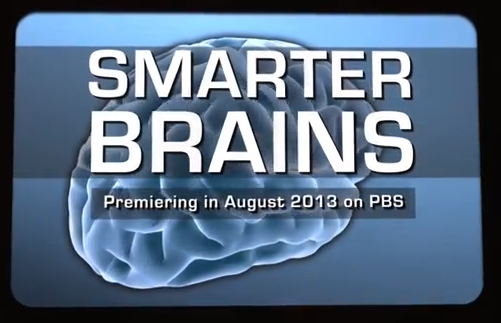Categories: Cognitive Development, Diet, IQ and EQ, Lifestyle, Training Tags:
Good Grades are Mostly Determined by Self-Control
 I am often asked by parents what type of skills are critical for success in school. They hear about special programs or techniques for reading, note taking or math skills and want to know if they work. That is why I am always on the lookout for scientific research that probes how the mind’s of high-performing students work.
I am often asked by parents what type of skills are critical for success in school. They hear about special programs or techniques for reading, note taking or math skills and want to know if they work. That is why I am always on the lookout for scientific research that probes how the mind’s of high-performing students work.
For example, recent research on nearly 700 German eighth graders suggests that a student’s level of self-control is the number one factor that determines success. It is more important than memory, general intelligence, verbal ability, mental speed, numerical ability and even creativity. The researchers claim:
“The data show that the most important factor in getting good school grades was the student’s score on psychological tests of self-control. Cognitive ability was the next best predictor of grades, but in fact, it was not a very strong one.”
While not a surprise to readers of the Next Brain Blog, this is an important finding. Delaying gratification, managing procrastination and the ability to structure and manage time are the capacities that students need for success.
I am interested to hear from readers with insights into how to be an effective student. What learning and testing taking skills are critical and how can we develop them?
Categories: Child, Cognitive Development, College Student, IQ and EQ, Memory and Learning, Training Tags:
Expand Working Memory – Your Brain’s Bandwidth
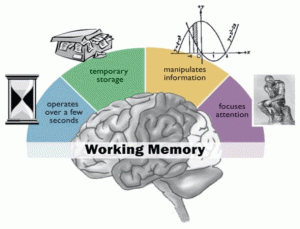 Working memory holds the contents of what we are paying attention to at any one time. It is a small active memory store that provides the information we process when thinking, making decisions, solving problems and performing other cognitive tasks. Working memory is like your conscious brain’s bandwidth, it is a measure of the amount of information that can be processed at any one time. The more bandwidth the higher your cognitive performance.
Working memory holds the contents of what we are paying attention to at any one time. It is a small active memory store that provides the information we process when thinking, making decisions, solving problems and performing other cognitive tasks. Working memory is like your conscious brain’s bandwidth, it is a measure of the amount of information that can be processed at any one time. The more bandwidth the higher your cognitive performance.
Research has shown that simple training tasks can expand our working memory and increase fluid intelligence or our reasoning and problem solving capabilities.
The training, called the n-back technique, presents you with a series of sounds or pictures. In the case where n = 2 you want to identify the sound or image that is just like the second one in the series. Once you master that you move up to n = 3 and identify the sound or image that is just like the third one in the series. As the value of n increases you must hold more and more information in your working memory. This exercises it like a muscle.
Doing n-back training for 20 minutes a day for 20 days produces a measurable improvement in reasoning and problem solving power. And it seems the level of improvement you get increases with the amount of training you do. According to research presented at the May 28th American Association for Psychological Science Meeting:
“These new studies demonstrate that the more training people have on the dual n-back task, the greater the improvement in fluid intelligence,” Jonides said.
They also found the effect works for children as well as adults and that single n-back training (focusing on the images OR the sounds) works as well as dual n-back training (focusing on the images AND the sounds).
N-back training is a perfect technique for a iPhone or mobile app. Unfortunately, I cannot find one. To get the technique a try, go to this free web-based application. To dig a bit more you might want to try The Brain Workshop but you have to download software to your computer.
Interested to hear from readers that do n-back training. What value of n have you reached? How has this type of training impacted your cognitive performance in everyday or professional tasks?
Source for Image: Working Memory
Categories: IQ and EQ, Memory and Learning Tags:
Music Lessons Offer Lifelong Cognitive Benefits
 Music is great for the brain in many ways. Learning to play a musical instrument is an excellent investment in improving brain function and cognitive performance. An interesting new study suggests that the brain boost we get from music lessons may last a lifetime. The study reported by the American Psychological Association examined the cognitive performance of adults (ages 60 t0 83) that studied music in childhood.
Music is great for the brain in many ways. Learning to play a musical instrument is an excellent investment in improving brain function and cognitive performance. An interesting new study suggests that the brain boost we get from music lessons may last a lifetime. The study reported by the American Psychological Association examined the cognitive performance of adults (ages 60 t0 83) that studied music in childhood.
“The high-level musicians who had studied the longest performed the best on the cognitive tests, followed by the low-level musicians and non-musicians, revealing a trend relating to years of musical practice. The high-level musicians had statistically significant higher scores than the non-musicians on cognitive tests relating to visuospatial memory, naming objects and cognitive flexibility, or the brain’s ability to adapt to new information.”
While these findings are tentative and require additional research, they do signal that musical training is a powerful tool for building your Next Brain.
Interested to hear from readers that were trained musically as children. How has that shaped your cognitive skills as an adult?
Categories: Child, IQ and EQ, Memory and Learning, Music and Audio, Older Adult, Perception, Problem Solving, Training Tags:
Does Thinking Out Loud Boost IQ and EQ?
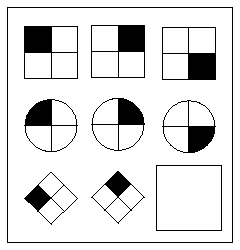 When working on a difficult problem or puzzle people will sometimes begin to mutter or even talk out loud. When trying to resist a tempting piece of chocolate cake or deal with an emotional issue we can coach ourselves with positive self talk that sometimes happens aloud.
When working on a difficult problem or puzzle people will sometimes begin to mutter or even talk out loud. When trying to resist a tempting piece of chocolate cake or deal with an emotional issue we can coach ourselves with positive self talk that sometimes happens aloud.
Can talking to yourself out loud make you a better problems solver or more emotionally intelligent?
Common practice says yes. Unfortunately, it is not very clear on when the technique might work. Plus there is no scientific evidence to back the idea up, until now.
Came across a unique study, How to Gain Eleven IQ Points in Ten Minutes, that found talking aloud can help in some circumstances. The key finding:
“… older adults performed significantly better only on the Raven’s Matrices while thinking aloud. Performance gains on this task were substantial (d = 0.73 and 0.92 in Experiments 1 and 2, respectively), corresponding to a fluid intelligence increase of nearly one standard deviation.”
Raven’s Matrices are used as a test for general or fluid intelligence. An example question is shown to the above.
Also of interest are the negative findings:
- No improvements were shown by younger adults
- Older adults did not show improvement on other cognitive tasks such as memory tests, perceptual tests, solving puzzles and so on.
More research is needed but the positive finding is so strong it is worth considering as part of your Next Brain development efforts.
Interested to hear from readers that use talk aloud strategies to improve brain function and cognitive performance.
Source of Image: Wikipedia
Categories: IQ and EQ, Lifestyle, Older Adult Tags:
Does Emotional Intelligence Peak in Your 60s?
 Emotional intelligence is our ability to spot, manage and generate emotions in ourselves and others. It appears to correlate better to life success than IQ. Emotional intelligence is not taught in school, it is learned (by some) through life experience. So it should be no surprise that it should improve as we age.
Emotional intelligence is our ability to spot, manage and generate emotions in ourselves and others. It appears to correlate better to life success than IQ. Emotional intelligence is not taught in school, it is learned (by some) through life experience. So it should be no surprise that it should improve as we age.
According to recent research from the University of California at Berkley, some aspects of emotional intelligence appear to peak in our 60s. These include:
- Effective use of positive reappraisal (seeing the bright side of things) to reinterpret negative situations in a positive way.
- Sensitivity to sadness or the ability to empathize with those feeling sad.
These are important findings as they help to further dispel the myth of universal cognitive decline with age. Understanding which aspects of cognitive performance naturally improve as we age should shape our approach to brain fitness.
Interested to hear from readers that have noticed improvements in Emotional Intelligence in older adults.
Categories: IQ and EQ, Lifestyle, Manage Emotions, Older Adult Tags: emotion, EQ
Training for a High-Performing Emotional Brain
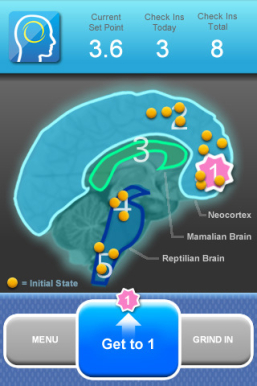 Emotions play a key and often dominate role in our brain function and cognitive performance. We create emotions anytime we appraise or make judgments on people, events, ideas or other things. Our ability to spot, understand and manage emotions in ourselves and others correlates more strongly to life success than IQ. So-called emotional intelligence is a cornerstone for high performance learning, decision-making, creativity, collaboration and other mental and social processes. So I am also on the lookout for new science-based techniques for training my emotional brain.
Emotions play a key and often dominate role in our brain function and cognitive performance. We create emotions anytime we appraise or make judgments on people, events, ideas or other things. Our ability to spot, understand and manage emotions in ourselves and others correlates more strongly to life success than IQ. So-called emotional intelligence is a cornerstone for high performance learning, decision-making, creativity, collaboration and other mental and social processes. So I am also on the lookout for new science-based techniques for training my emotional brain.
For example, take the work on Emotional Brain Training or EBT. It provides a simple way to assess which of five core brain states you are in and then suggests a tool for achieving self-regulation . The five brain states and associated tools are related to your level of stress and include:
- Balanced/reward (joy) state use the Sanctuary tool
- Balanced state use the Feelings check tool
- Verge of stress (mixed) state use the Emotional Housecleaning tool
- Stressed (unbalanced) state use the Cycle tool
- Full blown stress (underwhelmed) state use the Damage control tool
To get started right away you can download the Emotional Brain Training iPhone app (shown above) or find the equivalent in the Droid market.
 If you want to understand more of the theory behind how it works check out the new book, Wired for Joy. Or consider some of the training and coaching offerings from the Institute for Health Solutions.
If you want to understand more of the theory behind how it works check out the new book, Wired for Joy. Or consider some of the training and coaching offerings from the Institute for Health Solutions.
I am just learning to use EBT and am interested to hear from readers that have some experience with one or more of the five tools.
Categories: IQ and EQ, Lifestyle, Manage Emotions, Software, Training Tags: emotion, EQ, smart phone
Mozart Effect Does Not Improve Spatial Ability
 There is no doubt music has a big impact on how we think and feel. But can it be used to improve brain function and cognitive performance? We have explored this question with several posts on the Next Brain blog including one on the so-called Mozart effect. This effect claims that listening to Mozart’s music can increase your IQ.
There is no doubt music has a big impact on how we think and feel. But can it be used to improve brain function and cognitive performance? We have explored this question with several posts on the Next Brain blog including one on the so-called Mozart effect. This effect claims that listening to Mozart’s music can increase your IQ.
In an earlier post we found that there was some evidence that it can temporarily improve your spatial reasoning ability. Now the Science Daily reports on research from the University of Vienna that even dashes that hope. The study found that there is no evidence for the effect, not even a temporary improvement. It is important to note:
“Their comprehensive study of studies synthesizes the entirety of the scientific record on the topic. Retrieved for this systematic investigation were about 40 independent studies, published ones as well as a number of unpublished academic theses from the US and elsewhere, totaling more than 3000 participants.”
So this negative finding will likely stand. This of course does not mean that more active improvement techniques such as learning to play a musical instrument fail to boost cognitive performance.
Categories: IQ and EQ, Music and Audio Tags: Mozart Effect
Boost Happiness by 25% with Simple Gratitudes
 By consciously cultivating a sense of gratitude you can improve happiness by 25%. While this does not raise your IQ it definitely raises you emotional quotient or EQ by developing skills in recognizing and managing emotions.
By consciously cultivating a sense of gratitude you can improve happiness by 25%. While this does not raise your IQ it definitely raises you emotional quotient or EQ by developing skills in recognizing and managing emotions.
But how do you cultivate gratitude? For some excellent practical tips check out Enhance Happiness and Health by Cultivating Gratitude: Interview with Robert Emmons. Some examples:
“The most common method we use in our research is to ask people to keep a “Gratitude Journal” where you write something you feel grateful for. Doing so 4 times a week, for as little as 3 weeks, is often enough to create a meaningful difference in one’s level of happiness. Another exercise is to write a “Gratitude Letter” to a person who has exerted a positive influence on one’s life but whom we have not properly thanked in the past, and then to meet that person and read the letter to them face to face.”
I am interested to hear from readers that use specific techniques for building EQ through practicing gratitudes.
Categories: IQ and EQ, Lifestyle, Manage Emotions Tags: EQ, experiential learning, smart phone
Does Raising a Child Make You Smarter?
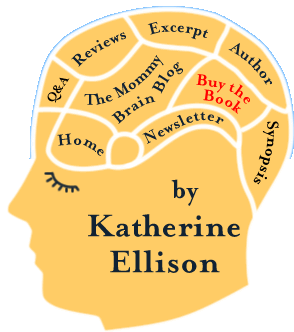 Absolutely, if you are the Mother! At least that is the argument made Katherine Ellison in her book the Mommy Brain: How Motherhood Makes Us Smarter.
Absolutely, if you are the Mother! At least that is the argument made Katherine Ellison in her book the Mommy Brain: How Motherhood Makes Us Smarter.
Motherhood gives a brain boost in many ways including face reading, multi-tasking, fearlessness, serenity, empathy, assertiveness and mental dexterity. These improvements in both IQ and EQ come from a combination of new hormones, motivation and practice that motherhood brings about.
The book is well founded in the latest neuroscience. It upends the stereotype of mothers checking their brains at the delivery room doors. Check out the Mommy Brain site by clicking on the graphic to the right.
Categories: Books, IQ and EQ, Lifestyle, Manage Emotions, Mental Focus, Parent, Perception Tags: embodied cognition, EQ

